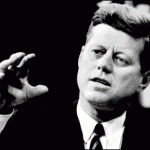 JFK revisionism is always jarring, but no longer surprises. The disdain toward John Kennedy in conservative intellectual circles seems borne out of contempt that he was what the right suspects about Barack Obama – unaccomplished, stylistic rather than substantive, a media darling who rose on the wings of a star-struck press.
JFK revisionism is always jarring, but no longer surprises. The disdain toward John Kennedy in conservative intellectual circles seems borne out of contempt that he was what the right suspects about Barack Obama – unaccomplished, stylistic rather than substantive, a media darling who rose on the wings of a star-struck press.
In my college years, it was the left-wing that was just as fierce – to them, Kennedy was a cold warrior who dug our grave in Vietnam and almost postured and bluffed into a nuclear war. To younger African American intellectuals, he was too passive on civil rights, too much of a follower to deserve the spot on the wall next to Dr. King in the grandparent’s living room.
 There is something that is meaner, though, in this week’s round of coverage of Mimi Alford’s tell-all regarding an affair between herself and Kennedy during her stint as a White House intern. Timothy Noah, at the New Republic, tops it off with a headline, “JFK: Monster”. But he only goes where others have gone this week: a condemnation of Kennedy as a psychological torturer, a crude user of a 19-year-old, and a voyeur.
There is something that is meaner, though, in this week’s round of coverage of Mimi Alford’s tell-all regarding an affair between herself and Kennedy during her stint as a White House intern. Timothy Noah, at the New Republic, tops it off with a headline, “JFK: Monster”. But he only goes where others have gone this week: a condemnation of Kennedy as a psychological torturer, a crude user of a 19-year-old, and a voyeur.
One point ought to be offered, perhaps not in Jack Kennedy’s defense, but in defense of those of us who still have not defined our view of him downward. I think that the theory that Noah articulates, that the president’s moral authority is further compromised, is just wrong. Kennedy’s moral dimensions never really drew on the shape of his private life: the sixties were too full of faithful men who burned crosses after church services, and shadowed men like Strom Thurmond, who defiled young black women while passing on dirt on Martin Luther King, for a conventional moral cloak to have meant much during that time.
Instead, the moral gloss that was Kennedy’s was the aura of a man brave enough to defend civil rights as a spiritually clear, compelling force. The night he went on TV and promoted integration that way, and queried if a white could bear to live the conditions of a black, Jack Kennedy did a moral thing. How he might have spent the rest of that night does not diminish it.
Kennedy was equally moral when he stood on a wall in Berlin and described capitalism and democracy as flawed instruments that still never had to stoop to build walls to keep their people in. That is the insight of someone offering the world a case for freedom that rested on dignity and not power or dogma – another word for that inspiration is morality. The same goes for the American University speech that embraced the seeds of detente as the need of a human race that “breathed the same air” and was equally at risk from missiles.
The fact is that Kennedy lived in the twilight between a time when politicians made no major pretensions of moral authority and a time when they over-did it, and their family portraits started obscuring the thinness of their records. His public morality seems gauzy, now, for two reasons: the tedium of the public debate today makes us forgetful about a more elevated era; and the term “morality” has been limited, and folded and stuffed in a box that the dullest of politicians can own (or profess to own).
What Jack Kennedy did with, and to Mimi Alford, is fodder for stone casters with no blemishes. When the couple of them get through, Kennedy will have some chinks. The moral authority will still be there.
(Cross-posted, with permission of the author, from OfficialArturDavis.com)









Leave a Reply